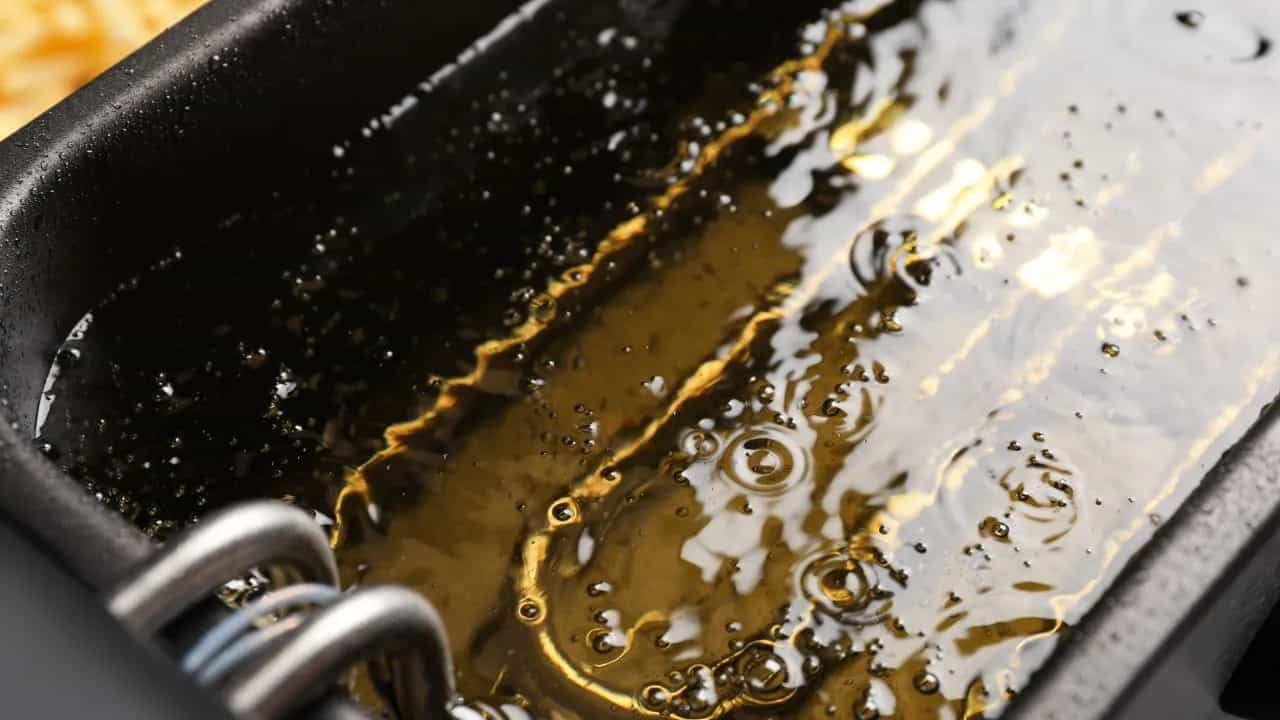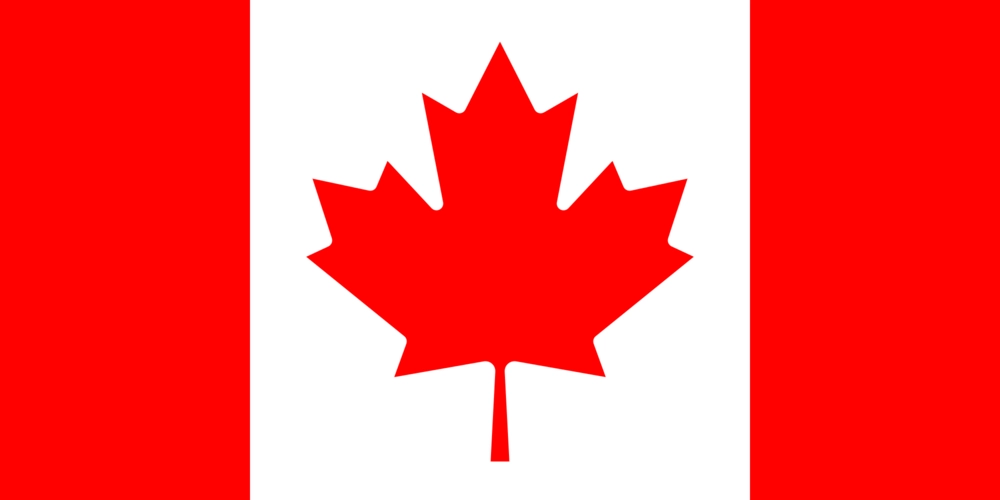Imagine your restaurant saving a big $7,280 each year just by doing simple upkeep. This figure comes from studies done by well-known commercial fryer makers. They found that cleaning your fryer oil regularly cuts down costs by at least 35%.
Many restaurants use several fryers at once, so the savings can really add up. Sadly, many owners don’t know that filtering oil daily can make it last a whole week instead of just three days. This isn’t only about numbers. It’s a mix of top-notch cooking and wise money management.
But it’s not all about the money. Keeping your oil clean is also about the quality of your food. Ever been let down by greasy, dark food when you wanted something golden and crispy? Using clean oil means your food will look and taste the way it should, attracting customers back for more.
As someone who knows kitchens well, I tell my clients how crucial oil filtration for a deep fryer is. What does it do? It keeps your food tasting great and makes your kitchen run better, saving you money. With a good plan for filtering your oil, your kitchen can excel in great taste and good finances. This makes every fried meal a win for both your guests and your budget.
Overview of Deep Fryer Oil Filtration Systems
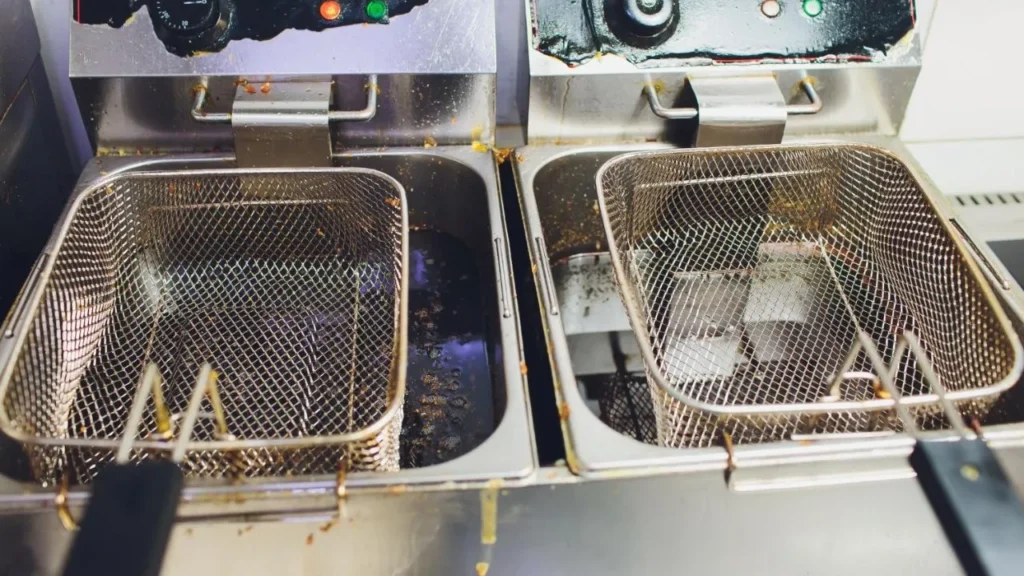
Deep fryer oil filtration systems improve kitchen work, food quality, and cooking results. They maintain oil quality, which is crucial for taste, savings, and health in busy kitchens. Knowing why these systems matter in places that use deep fryers a lot is key.
Importance of Oil Filtration in Deep Frying
Filtration systems remove bad particles from oil, making it last longer. They make food taste better and save money for restaurants. Systems like Anets and Frymaster use smart tech for better safety and results.
- Anets fryers feature automated filtration to reduce manual labor and optimize oil usage.
- Frymaster’s stainless steel fryers resist corrosion, highlighting the role of oil filtration in equipment longevity.
- High-efficiency filtration systems remove particles as small as 5 microns, significantly extending oil life.
- Advanced filtration systems with safety features like automatic shut-offs and secure chambers enhance kitchen safety and reliability.
- Premium oil filtration, such as Frymate systems, reduces oil consumption, improves food quality, extends oil life, and increases profitability.
Dual-stage and active filters keep oil pure and help the environment by cutting waste. Research shows good oil management can make oil last longer and food taste better. Experts like Blumenthal and works by Chow and Gupta support this.
Regular, accurate filtration is key for top fryer function and consistent food taste. So, deep fryer oil filtration has many pluses, from flavor to saving money and helping the planet.
How Oil Filtration Deep Fryers Work
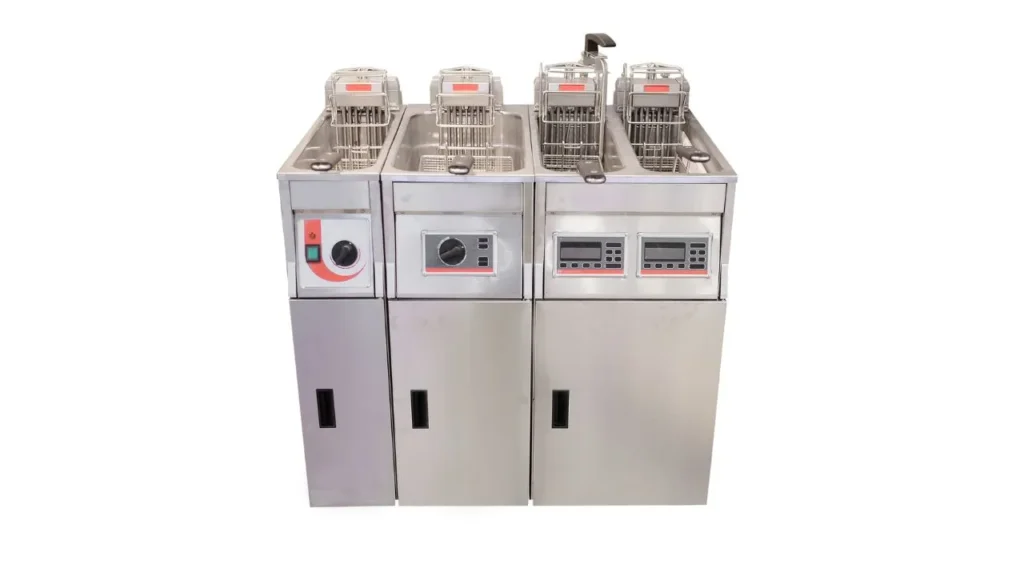
Understanding how an oil filtration deep fryer works is key in any kitchen. It keeps the food quality high and saves oil, which cuts costs. This helps the kitchen run smoothly and efficiently.
Basic Components of a Deep Fryer
A deep fryer has several key parts. It has a frying chamber, heating element, thermostat, and oil filtration system. These parts work together to fry food reliably, whether it’s a portable or built-in model.
The Filtration Process Explained
- Draining and Filtering: First, used oil with food particles and residues is drained. It goes through a filtration system that catches these particles. This step is key to keep the oil clean and reusable.
- Oil Recycling: After filtering, the oil is refined. This process removes small particles and impurities. It helps the oil last longer and keeps the food tasting good.
- Temperature Management: Keeping the right temperature is important. It stops the oil from spoiling too fast. Also, turning off fryers saves energy and keeps the oil better for longer.
- Regular Maintenance: It’s good to skim and test the oil often. A routine for cleaning and filtering the fryer helps keep the oil in top shape. This is good for food quality and safety.
Using an oil filtration deep fryer wisely helps with kitchen management and saves money. A good system for filtering oil is a smart choice for any kitchen. It helps achieve great results and save costs.
Types of Oil Filtration Systems for Deep Fryers
It’s important to pick the right oil filtration system for your deep fryer. This can help keep things running smoothly and make your cooking oil last longer. There are two main types, each suited for different needs and sizes of businesses.
Passive Filtration Systems
Passive systems like filter pots and cone filters are simple but work well. They use gravity to pull the oil through filters. This catches any bits and pieces left behind. These systems are great because they’re cheap and easy to use. They’re perfect for smaller places or if you don’t fry a lot.
- Cost-effective solution, ideal for budget-conscious kitchens.
- Users can easily replace the disposable filters or clean the reusable types, ensuring easy cleaning and maintenance.
- Generally involves manual labor, enhancing control over the filtration process but requiring more time and effort from staff.
Active Filtration Systems
Active systems are a better pick for big kitchens or ones that fry a lot. They use a pump to move the oil through filters. This gets rid of small food pieces and debris. Devices like the Frymaster’s PF50R-240 and Vito Portable Oil Filter Machine are top-notch. They can filter out particles as tiny as 5 microns.
- Elevates kitchen productivity by providing quick, automated filtering, reducing downtime.
- High-quality filters enhance the removal of impurities, promoting healthier cooking environments and tastier food.
- Additional safety features, such as automatic shut-offs and temperature controls, safeguard against potential accidents.
- While initially more expensive, the long-term savings in oil costs provide a significant return on investment.
Knowing what your kitchen needs in terms of oil use and staff will help you choose the best system. Whether you go with a passive or active system, the right choice will make your food taste better. It will also keep your workplace safe and save you money in the long run.
Benefits of Using Oil Filtration Deep Fryers

For restaurant owners and chefs, it’s key to know the big benefits of oil management systems in deep fryers. They make your kitchen work better and decrease the costs of running it. Also, they keep up high safety and health standards.
Cost Savings
Using top-notch filtration tech like Henny Penny’s Oil Filtration System can cut your oil costs by half. This is a huge deal for businesses that use a lot of oil. Systems like the ones from Pitco, with built-in filtration, keep your oil good for longer. So, you can save more money.
Prolonged Oil Life
Filtering oil often, with gear like Solstice filter drawers, keeps the oil better for a longer time. This makes fried foods taste and feel better. Plus, it means you don’t have to buy new oil as much, saving money.
Reduced Frequency of Oil Purchase
Oil management systems in deep fryers clean the oil well. They get rid of both big and tiny bits that shouldn’t be there. Clean oil means you don’t need to buy it as often. This is a good reason for restaurant owners to get these systems. They pay off fast because you spend less on oil.
Health and Safety
Handling hot oil can be dangerous. Filtration systems in the fryer lower the risk because you don’t have to touch the oil much. Also, keeping the oil clean helps stop foodborne illnesses. This helps kitchens follow health rules better.
If you run a restaurant or kitchen, getting a good oil management system makes everything run smoother. It also helps the planet. Darling Ingredients Canada talks about how to recycle used cooking oil right. This stops too much trash from ending up in landfills.
Choosing advanced oil management means your kitchen uses resources better. It also makes your kitchen safer, healthier, and more cost-efficient.
Choosing the Right Oil Filtration Deep Fryer
In the busy heart of your restaurant’s kitchen, picking the right oil filtration deep fryer is key. The best choice ensures delicious food, boosts your kitchen’s efficiency, and saves money. Let’s dive into important features to consider and look at some top models for your place.
Key Features to Consider
- Durability: Heavy gauge construction, ideally 16 gauge, is essential for enduring the hectic environment of commercial kitchens.
- Efficiency: Opt for fryers with efficient heat exchangers and fast recovery times to keep up with the high demand during peak hours.
- Temperature Control: Precise controls are crucial for consistency, especially if your restaurant has multiple locations.
- Safety Features: Look for fryers with automatic shut-off, overheat protection, and cool-touch handles to enhance safety in the kitchen.
Comparisons of Popular Models
Looking at models from Vulcan and Pitco helps in making a good choice. These brands are top-notch, offering great quality and innovation in their oil filtration deep fryers for restaurants.
- Vulcan: Known for durable built-in oil filtration systems, Vulcan fryers are reliable. They help save on oil costs over time and suit all sizes of operations.
- Pitco: Pitco fryers with internal filtration systems are great for efficiency. They quickly filter cooking oil, keeping fry conditions ideal. They’re perfect for busy places.
- Comparative Benefits: Although pricier at first, built-in systems usually lead to more savings in both oil costs and labor as time goes on. They’re a smart investment for active restaurants.
Choosing the right deep fryer with an oil filtration system is about weighing costs and benefits. Whether it’s a built-in system from Vulcan or Pitco, or a budget-friendly portable unit, focus on quality, safety, and efficiency. This choice will significantly affect your kitchen’s efficiency, cost savings, and food quality.
Maintenance and Cleaning of Deep Fryer Oil Filtration Systems
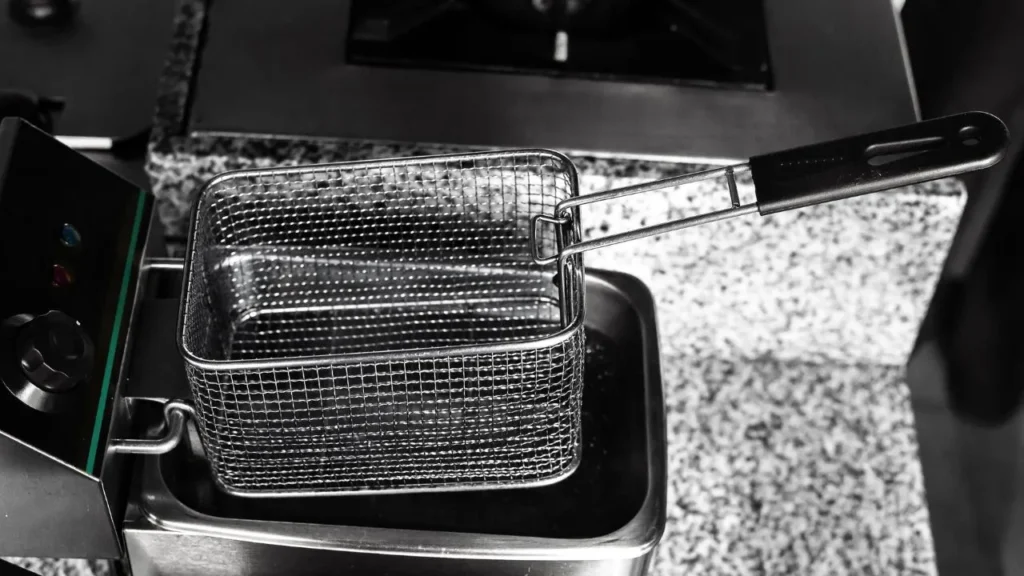
I know that keeping deep fryer oil filtration systems clean and doing regular checks are key for a great kitchen. This not only keeps food tasting good but also makes your kitchen gear last longer. It helps save money over time, too.
Steps for Regular Maintenance
- Filter the fryer oil twice a day to keep the oil good for longer. This is very important if you’re cooking a lot.
- Always check and adjust fryer temperatures so food fries perfectly. This helps the oil stay good and keeps food tasting great.
- Skim the oil surface every 15 minutes to keep the oil clean. This simple step improves food’s flavor and texture.
- Teach kitchen staff how to correctly use and care for fryers. Turn them off when not needed to save energy and keep the oil fresh.
- Use oil test strips sometimes to check for free fatty acids. This shows when the oil needs to be changed.
Common Troubleshooting Tips
- Check the fryer’s filtration system O-rings and seals regularly. Replace them twice a year to avoid pump problems.
- If the filtration pump isn’t working right, ensure everything is put together correctly. Also, make sure it’s not blocked by food or solid oil.
- Don’t put water or cleaners through the oil filter. It can hurt the pump and ruin the oil.
- Follow the maker’s advice for deep cleans to avoid issues like bad oil and broken equipment.
- If you have tough problems, call experts from trusted companies like Restaurant Technologies. They know a lot about Total Oil Management systems.
By following these deep fryer care and cleaning tips, you’ll make your kitchen work smoother and cook better. A clean oil filtration system means tastier food, less risk, and lower costs.
Innovative Technologies in Oil Filtration for Deep Fryers
The culinary world is always changing. Now, we’re seeing more advanced technology in deep fryer oil filtration. This technology makes kitchens run smoother. It helps make food better and also saves money.
Advances in Filtration Media
Modern filtration media can filter out tiny particles, up to 5 microns. This helps make the frying oil last longer. It also cuts down on waste and saving costs. Brands like Anets are leading the way by making oil filtration easier and reducing the need for manual work.
Smart Technology and Automation
- Automation in Oil Filtration: The Frymaster deep fryer series has automated systems. These systems make filtering fast and safe. They also give consistent results with less need for people to watch over them.
- Smart Technology Implementation: Smart technology in deep fryers gives updates on the oil’s condition. This information helps kitchen staff manage the oil better. It helps the oil last longer and reduces costs.
These systems come with automatic shut-offs and safe filtration chambers. They make kitchens safer. They also use less oil and help keep the environment clean. Modern deep fryers are good for the earth and help save money.
Pressure frying and new frying tech reduce the oil food absorbs. This makes meals healthier. It also speeds up cooking times and saves energy.
To sum up, smart deep fryers and automated oil filtration bring many advantages. They help oil last longer, save money, and are safe. They’re good for the planet too. This matches the food industry’s goal to be more sustainable.
Maximizing Kitchen Efficiency with Oil Filtration Deep Fryers
Exploring deep fryer oil filtration shows it’s a key choice for kitchens. It’s not just upkeep; it’s about making operations better and food tastier. By using advanced filters, kitchens can save on costs and keep food tasting great.
Filter technology also boosts safety and keeps cooking at high standards. This ensures that the food not only tastes good but is also safe to eat.
Summary of Benefits
Choosing the right filter matters a lot for performance. Filters need to match your fryer type and kitchen size. It goes beyond just food quality; it’s about making the eating experience better.
Good taste and consistent quality keep customers coming back. Modern fryers also have safety features like auto shut-off, which makes kitchens safer.
Being energy smart and making good use of kitchen space are important, too. Options like infrared and ventless fryers help keep costs low but keep up with lots of frying. By focusing on quality filters and regular care, you boost flavor and safety. This moves your restaurant towards making more money and keeping customers happy.
FAQ
Is filtering fryer oil worth it?
Consistent filtration is the most important step in extending the life of your fryer oil. It also helps ensure consistent food quality and keeps operational costs down. Follow these easy steps for proper cooking oil filtration: filter your cooking oil at least twice a day and for a minimum of five minutes per fryer vat.
Can you filter deep fryer oil?
Yes, you can filter deep fryer oil. Here’s a video tutorial to help you understand the process: how to filter fryer oil.
How do you filter oil in a commercial fryer?
To filter oil in a commercial fryer, follow these steps:
- Cool Down: Allow the fryer oil to cool to a safe temperature.
- Drain the Oil: Use the fryer’s drain valve to empty the oil into a suitable container.
- Filter the Oil: Pass the oil through a commercial fryer oil filter machine or a manual filter system with filter paper or a mesh filter.
What is an oil filtration deep fryer and how does it work?
An oil filtration deep fryer is a kitchen appliance that features a built-in system to filter and clean cooking oil, extending its usability and maintaining optimal frying conditions. It works by using a filtration mechanism, often a mesh filter or a pump system, to remove food particles and impurities from the oil after each frying session. This ensures cleaner oil for subsequent uses and improves the quality of fried foods.
What are the benefits of using a deep fryer with an oil filtration system?
A deep fryer with an oil filtration system offers several benefits, including extending the life of the cooking oil by removing food particles and impurities, which can lead to cost savings. Additionally, it ensures consistent food quality by maintaining cleaner oil, resulting in better-tasting and healthier fried foods. This system also reduces waste and contributes to a more eco-friendly kitchen environment.
Resources
https://www.dinecompany.com/blog/fryer-oil-filtration
https://www.rti-inc.com/fryer-filtration-monitoring/how-often-to-filter-your-cooking-oil/


